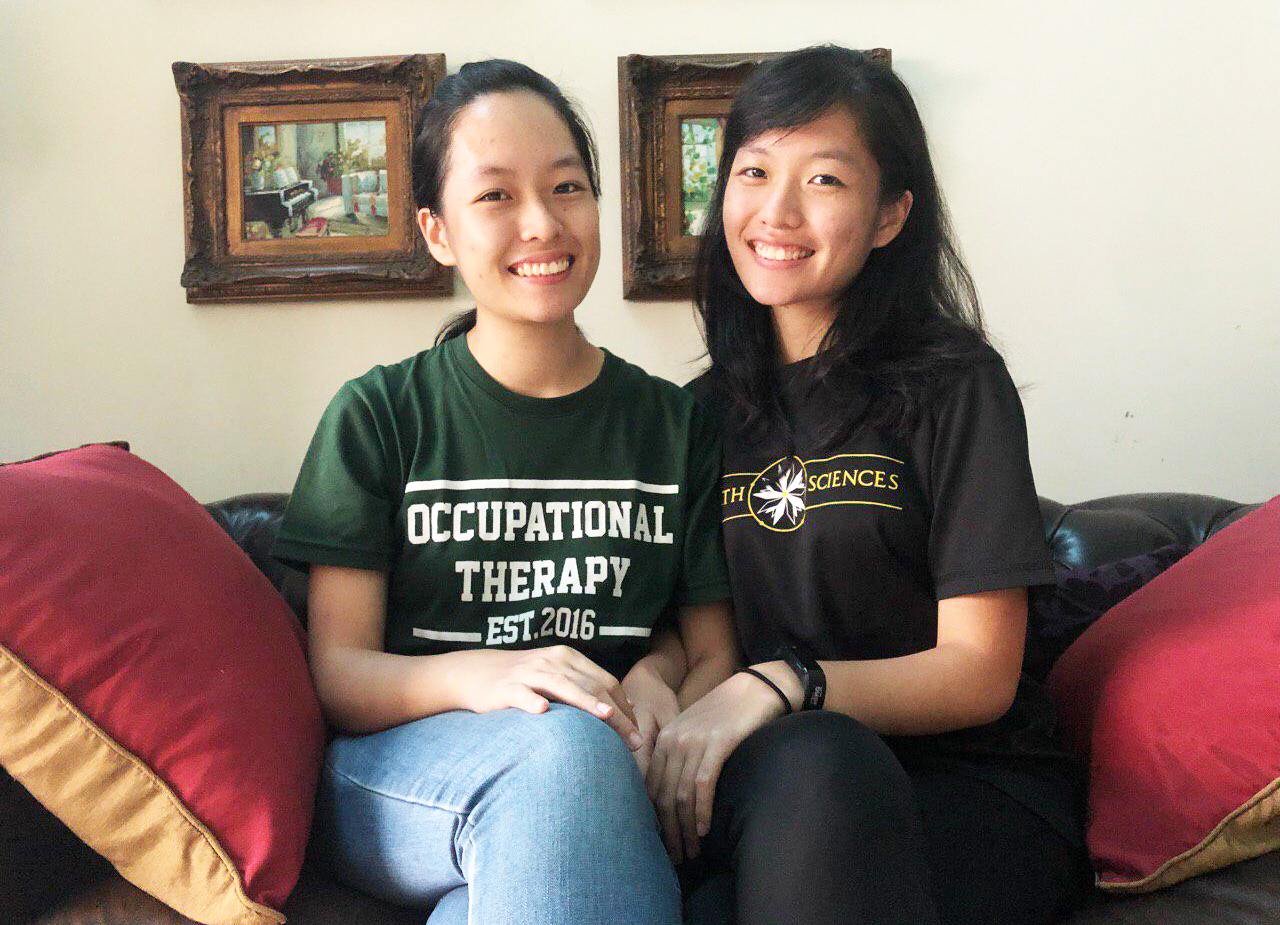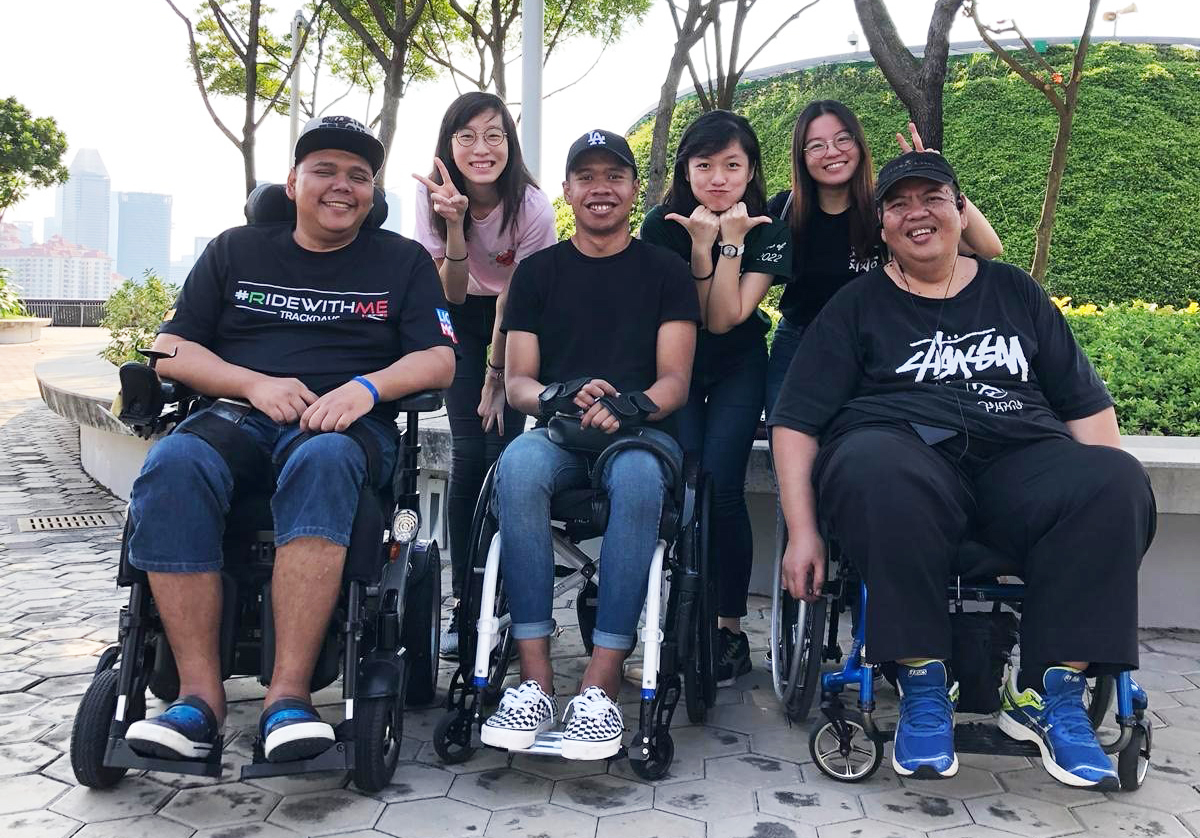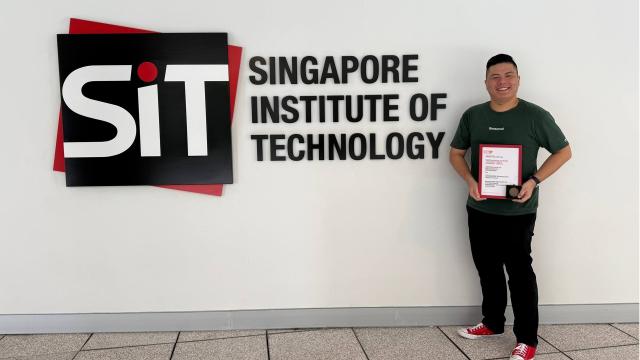Before being paired up in groups with persons with disabilities (PWDs) who volunteer as community teachers, twin sisters Johanna Faith Foo Shuan Enn, and Joanne Faith Foo Shuan Hui, both 22, did not know much about them and were hesitant to approach them.
“Initially, I was scared. I knew that there would be topics that would be too sensitive for us to touch on, such as their living conditions or how they met with an accident,” Joanne begins. “I felt anxious about talking to them, because I was afraid that what I say would offend them.”
All that changed when the twin sisters, who are both Year Two students in SIT’s Occupational Therapy degree programme, met their community teachers. “When we met our community teacher, we were very surprised as he was the one who initiated the conversation. He shared about the accident that he met with, and assured us that it was okay to ask him anything. He knew that we wanted to learn, and wanted to learn from us too,” shares Johanna.

Joanne Faith Foo (left) and Johanna Faith Foo (right) are twin sisters, both reading SIT’s Bachelor of Science (Hons) in Occupational Therapy.
As part of their occupational therapy degree, Occupational Therapy (OT) students are empowered to observe and participate in the lives of PWDs as early as in the first trimester of their first year. As future occupational therapists, students will have to study how daily tasks such as household chores and buying food from the hawker centre can be done differently with physical limitations. Students thus met in groups to observe and learn from their community teachers’ interactions in their homes and sporting arenas.
“I thought PWDs had difficulties being independent, hold full-time jobs, or participate in sports,” Joanne shares, adding that her community teacher in fact held a high position in his company. With the right support, systems and infrastructure, Joanne believes that PWDs could travel, be independent and keep active through sports such as wheelchair basketball and bowling.
“As students, there are days when we completely indulge in our own problems, but these are actually minor compared to the difficulties PWDs face. For PWDs, work is actually liberating. They feel youthful, and they feel like they can contribute to society,” Johanna affirms. “Through our interactions, I learnt to better appreciate the things around me.”

SIT OT students (back row from left to right) Edlina, Johanna and Chloe, with their community teachers (front row from left to right) Firdaus, Jamirul and Jaslee.
Driving learning outcomes
Before their first community visit, students are required to attend a talk on professionalism and communication to learn how to better connect with PWDs.
“Our tutor encouraged us to visualise our first engagement with our community teacher, so we brainstormed possible conversation topics,” Joanne recounts. “We also picked up communication tips through our role-plays, and gave each other feedback. As our tutor says, it is important to know a person beyond his or her disability.”
After each community visit, students thoughtfully document their observations and reflections on living with a disability. They must also submit reports on their community teacher’s abilities and disabilities, occupational forms and choices, as well as possible actions that society can take to help PWDs feel included. This challenges students’ preconceived ideas on disability and facilitates their reflection on how health and disability can co-exist.
“Disability is definitely more than just using a wheelchair,” Johanna asserts. “It is also about community support and accessibility in the built environment. Our community teacher has certainly changed our prior stereotypes of PWDs. Being out in the community and interacting with PWDs as early as year one, week three is truly an eye-opening experience.”
Forging Community Partnerships
SIT’s programme would not have been possible without community teacher volunteers, whose conditions range from spinal cord injuries, visual impairments, stroke and neuro-muscular disorders.
“We were on the lookout for PWDs who would be willing to share their experiences with students and talk about their disabilities,” Associate Professor May Lim, Director, Centre for Learning Environment and Assessment Development (CoLEAD) at SIT explains. With the help of social service agencies in Singapore, A/Prof Lim and her team sent out invitations and was encouraged by the positive response.
“We designed this experiential learning programme to co-educate a new generation of healthcare professionals and imprint a positive perspective of disability,” A/Prof Lim reveals, elaborating on SIT’s aim to foster a more equalised and reciprocal power relationship between future healthcare professionals and PWDs.
Besides experiential learning, SIT’s OT degree programme also facilitates horizontal integration of learning through project work. Students are asked to discuss knowledge learnt throughout the trimester, such as Model of Human Occupation, Anatomy and Physiology, and how these applied to their community teachers. At the end of the module, groups are asked to present their insights so that students may learn from one another.
Although two individuals may have the same medical diagnosis and similar disability, A/Prof Lim stresses to students that their individual abilities and struggles may differ. “Throughout the module, we emphasise the need to treat each patient as a unique individual. In fact, in their future clinical practice, students may meet people with newly-acquired disabilities and their outlook and attitudes may again be different.”
“We are grateful for the strong support from our community teachers in achieving our educational goals. We definitely see the potential to expand such experiential learning approaches to other health sciences disciplines.”
The case study on 'Experiential Learning and its Impact on Students' Attitudes towards Persons with Disability' was featured in the book 'Applied Learning in Higher Education: Perspectives, Pedagogy, and Practice'. The book is available for purchase online from Informing Science Press, Amazon, and Google Play.















![[FA] SIT One SITizen Alumni Initiative_Web banner_1244px x 688px.jpg](/sites/default/files/2024-12/%5BFA%5D%20%20SIT%20One%20SITizen%20Alumni%20Initiative_Web%20banner_1244px%20x%20688px.jpg)


